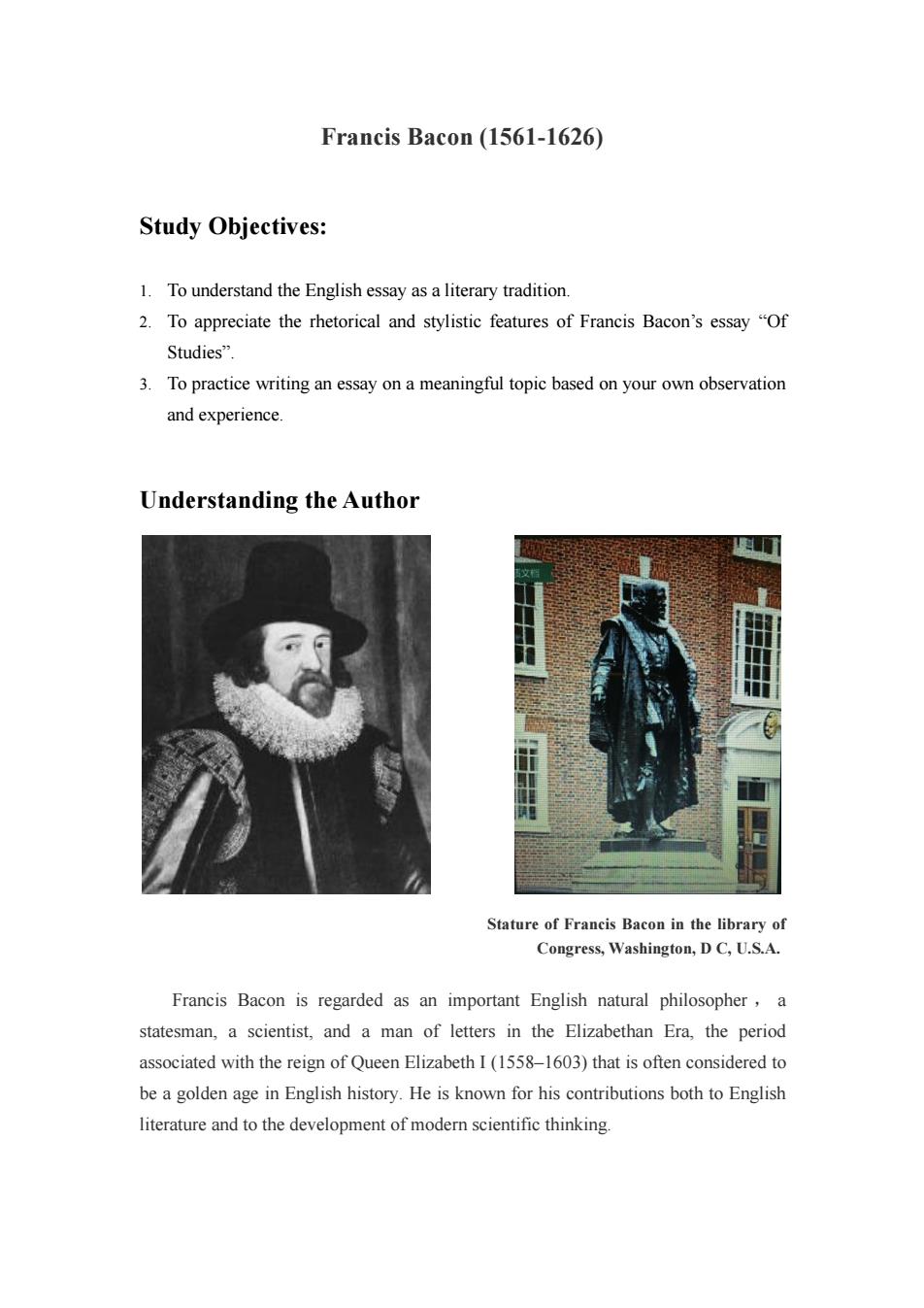
Francis Bacon (1561-1626) Study Objectives: 1.To understand the English essay as a literary tradition. 2.To appreciate the rhetorical and stylistic features of Francis Bacon's essay "Of Studies". 3.To practice writing an essay on a meaningful topic based on your own observation and experience. Understanding the Author Stature of Francis Bacon in the library of Congress,Washington,D C,U.S.A. Francis Bacon is regarded as an important English natural philosopher,a statesman,a scientist,and a man of letters in the Elizabethan Era,the period associated with the reign of Queen Elizabeth I(1558-1603)that is often considered to be a golden age in English history.He is known for his contributions both to English literature and to the development of modern scientific thinking
Francis Bacon (1561-1626) Study Objectives: 1. To understand the English essay as a literary tradition. 2. To appreciate the rhetorical and stylistic features of Francis Bacon’s essay “Of Studies”. 3. To practice writing an essay on a meaningful topic based on your own observation and experience. Understanding the Author Stature of Francis Bacon in the library of Congress, Washington, D C, U.S.A. Francis Bacon is regarded as an important English natural philosopher , a statesman, a scientist, and a man of letters in the Elizabethan Era, the period associated with the reign of Queen Elizabeth I (1558–1603) that is often considered to be a golden age in English history. He is known for his contributions both to English literature and to the development of modern scientific thinking
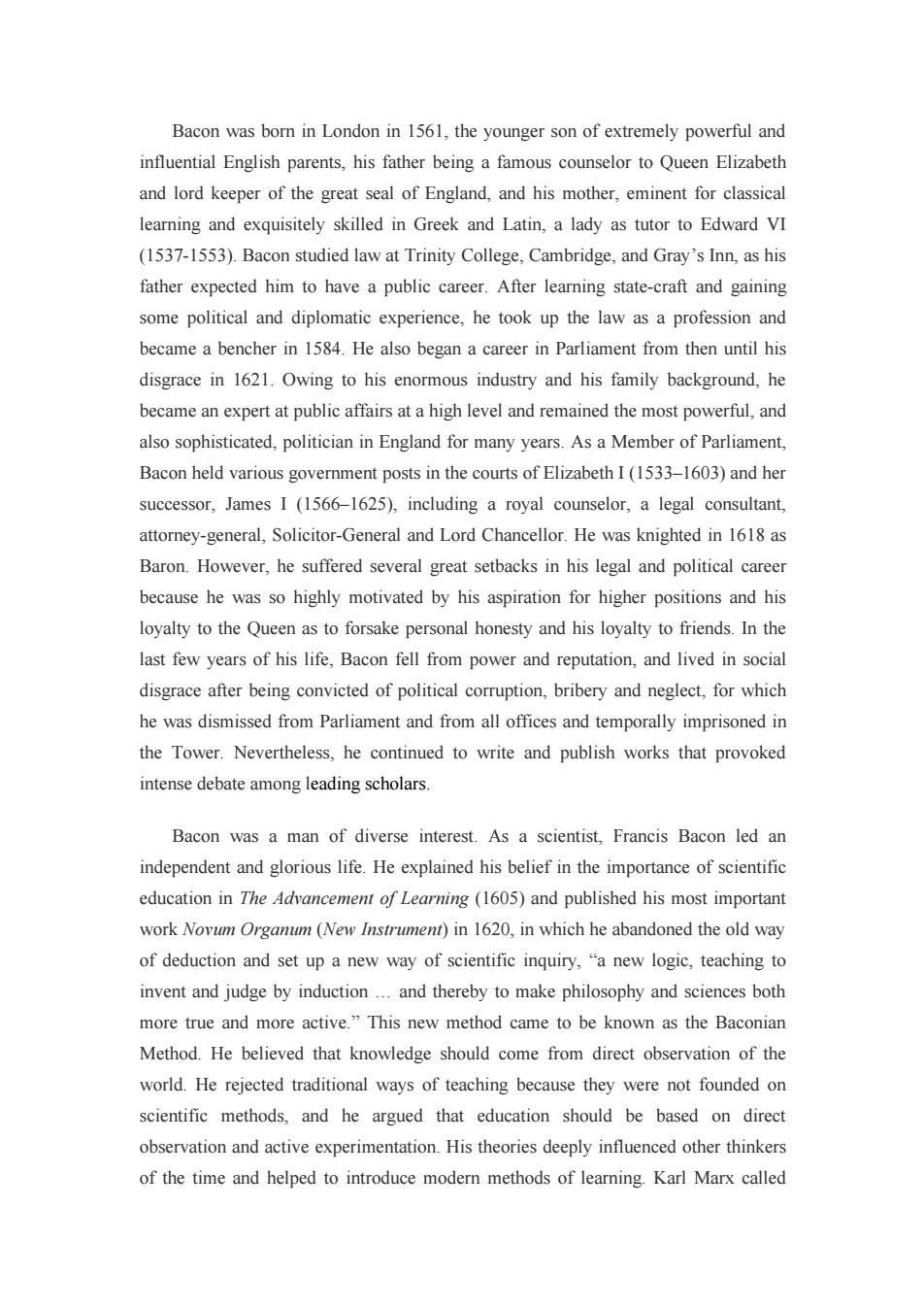
Bacon was born in London in 1561,the younger son of extremely powerful and influential English parents,his father being a famous counselor to Queen Elizabeth and lord keeper of the great seal of England,and his mother,eminent for classical learning and exquisitely skilled in Greek and Latin,a lady as tutor to Edward VI (1537-1553).Bacon studied law at Trinity College,Cambridge,and Gray's Inn,as his father expected him to have a public career.After learning state-craft and gaining some political and diplomatic experience,he took up the law as a profession and became a bencher in 1584.He also began a career in Parliament from then until his disgrace in 1621.Owing to his enormous industry and his family background,he became an expert at public affairs at a high level and remained the most powerful,and also sophisticated,politician in England for many years.As a Member of Parliament, Bacon held various government posts in the courts of Elizabeth I(1533-1603)and her successor,James I (1566-1625),including a royal counselor,a legal consultant, attorney-general,Solicitor-General and Lord Chancellor.He was knighted in 1618 as Baron.However,he suffered several great setbacks in his legal and political career because he was so highly motivated by his aspiration for higher positions and his loyalty to the Queen as to forsake personal honesty and his loyalty to friends.In the last few years of his life,Bacon fell from power and reputation,and lived in social disgrace after being convicted of political corruption,bribery and neglect,for which he was dismissed from Parliament and from all offices and temporally imprisoned in the Tower.Nevertheless,he continued to write and publish works that provoked intense debate among leading scholars. Bacon was a man of diverse interest.As a scientist,Francis Bacon led an independent and glorious life.He explained his belief in the importance of scientific education in The Advancement of Learning (1605)and published his most important work Novum Organum(New Instrument)in 1620,in which he abandoned the old way of deduction and set up a new way of scientific inquiry,"a new logic,teaching to invent and judge by induction...and thereby to make philosophy and sciences both more true and more active."This new method came to be known as the Baconian Method.He believed that knowledge should come from direct observation of the world.He rejected traditional ways of teaching because they were not founded on scientific methods,and he argued that education should be based on direct observation and active experimentation.His theories deeply influenced other thinkers of the time and helped to introduce modern methods of learning.Karl Marx called
Bacon was born in London in 1561, the younger son of extremely powerful and influential English parents, his father being a famous counselor to Queen Elizabeth and lord keeper of the great seal of England, and his mother, eminent for classical learning and exquisitely skilled in Greek and Latin, a lady as tutor to Edward VI (1537-1553). Bacon studied law at Trinity College, Cambridge, and Gray’s Inn, as his father expected him to have a public career. After learning state-craft and gaining some political and diplomatic experience, he took up the law as a profession and became a bencher in 1584. He also began a career in Parliament from then until his disgrace in 1621. Owing to his enormous industry and his family background, he became an expert at public affairs at a high level and remained the most powerful, and also sophisticated, politician in England for many years. As a Member of Parliament, Bacon held various government posts in the courts of Elizabeth I (1533–1603) and her successor, James I (1566–1625), including a royal counselor, a legal consultant, attorney-general, Solicitor-General and Lord Chancellor. He was knighted in 1618 as Baron. However, he suffered several great setbacks in his legal and political career because he was so highly motivated by his aspiration for higher positions and his loyalty to the Queen as to forsake personal honesty and his loyalty to friends. In the last few years of his life, Bacon fell from power and reputation, and lived in social disgrace after being convicted of political corruption, bribery and neglect, for which he was dismissed from Parliament and from all offices and temporally imprisoned in the Tower. Nevertheless, he continued to write and publish works that provoked intense debate among leading scholars. Bacon was a man of diverse interest. As a scientist, Francis Bacon led an independent and glorious life. He explained his belief in the importance of scientific education in The Advancement of Learning (1605) and published his most important work Novum Organum (New Instrument) in 1620, in which he abandoned the old way of deduction and set up a new way of scientific inquiry, “a new logic, teaching to invent and judge by induction … and thereby to make philosophy and sciences both more true and more active.” This new method came to be known as the Baconian Method. He believed that knowledge should come from direct observation of the world. He rejected traditional ways of teaching because they were not founded on scientific methods, and he argued that education should be based on direct observation and active experimentation. His theories deeply influenced other thinkers of the time and helped to introduce modern methods of learning. Karl Marx called
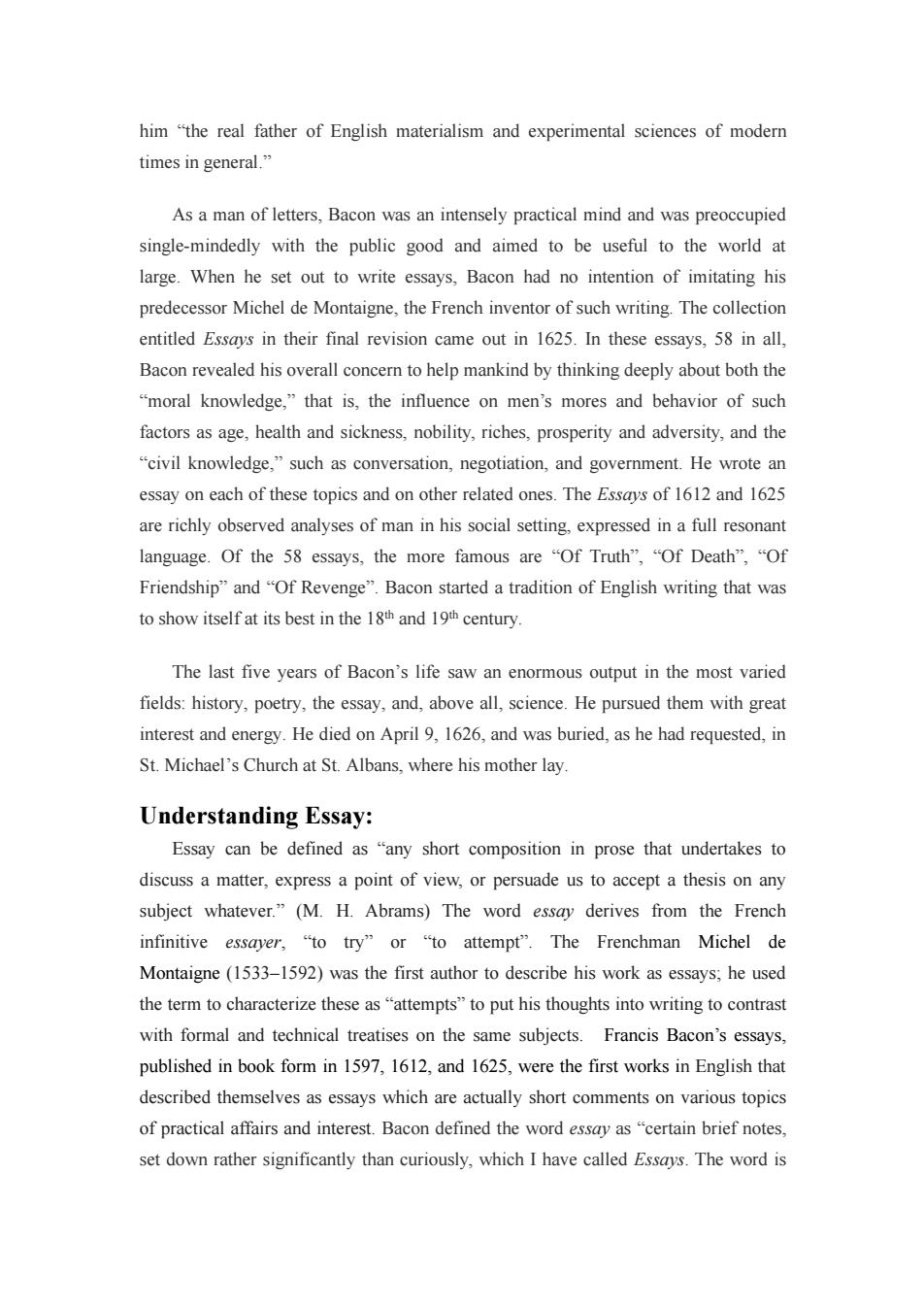
him "the real father of English materialism and experimental sciences of modern times in general.” As a man of letters,Bacon was an intensely practical mind and was preoccupied single-mindedly with the public good and aimed to be useful to the world at large.When he set out to write essays,Bacon had no intention of imitating his predecessor Michel de Montaigne,the French inventor of such writing.The collection entitled Essays in their final revision came out in 1625.In these essays,58 in all, Bacon revealed his overall concern to help mankind by thinking deeply about both the "moral knowledge,"that is,the influence on men's mores and behavior of such factors as age,health and sickness,nobility,riches,prosperity and adversity,and the "civil knowledge,"such as conversation,negotiation,and government.He wrote an essay on each of these topics and on other related ones.The Essays of 1612 and 1625 are richly observed analyses of man in his social setting,expressed in a full resonant language.Of the58 essays,the more famous are“Of Truth”,“Of Death”,“Of Friendship"and "Of Revenge".Bacon started a tradition of English writing that was to show itself at its best in the 18th and 19th century. The last five years of Bacon's life saw an enormous output in the most varied fields:history,poetry,the essay,and,above all,science.He pursued them with great interest and energy.He died on April 9,1626,and was buried,as he had requested,in St.Michael's Church at St.Albans,where his mother lay. Understanding Essay: Essay can be defined as "any short composition in prose that undertakes to discuss a matter,express a point of view,or persuade us to accept a thesis on any subject whatever."(M.H.Abrams)The word essay derives from the French infinitive essayer,“to try”or“to attempt'”.The Frenchman Michel de Montaigne(1533-1592)was the first author to describe his work as essays;he used the term to characterize these as "attempts"to put his thoughts into writing to contrast with formal and technical treatises on the same subjects.Francis Bacon's essays, published in book form in 1597,1612,and 1625,were the first works in English that described themselves as essays which are actually short comments on various topics of practical affairs and interest.Bacon defined the word essay as "certain brief notes, set down rather significantly than curiously,which I have called Essays.The word is
him “the real father of English materialism and experimental sciences of modern times in general.” As a man of letters, Bacon was an intensely practical mind and was preoccupied single-mindedly with the public good and aimed to be useful to the world at large. When he set out to write essays, Bacon had no intention of imitating his predecessor Michel de Montaigne, the French inventor of such writing. The collection entitled Essays in their final revision came out in 1625. In these essays, 58 in all, Bacon revealed his overall concern to help mankind by thinking deeply about both the “moral knowledge,” that is, the influence on men’s mores and behavior of such factors as age, health and sickness, nobility, riches, prosperity and adversity, and the “civil knowledge,” such as conversation, negotiation, and government. He wrote an essay on each of these topics and on other related ones. The Essays of 1612 and 1625 are richly observed analyses of man in his social setting, expressed in a full resonant language. Of the 58 essays, the more famous are “Of Truth”, “Of Death”, “Of Friendship” and “Of Revenge”. Bacon started a tradition of English writing that was to show itself at its best in the 18 th and 19 th century. The last five years of Bacon’s life saw an enormous output in the most varied fields: history, poetry, the essay, and, above all, science. He pursued them with great interest and energy. He died on April 9, 1626, and was buried, as he had requested, in St. Michael’s Church at St. Albans, where his mother lay. Understanding Essay: Essay can be defined as “any short composition in prose that undertakes to discuss a matter, express a point of view, or persuade us to accept a thesis on any subject whatever.” (M. H. Abrams) The word essay derives from the French infinitive essayer, “to try” or “to attempt”. The Frenchman Michel de Montaigne (1533–1592) was the first author to describe his work as essays; he used the term to characterize these as “attempts” to put his thoughts into writing to contrast with formal and technical treatises on the same subjects. Francis Bacon’s essays, published in book form in 1597, 1612, and 1625, were the first works in English that described themselves as essays which are actually short comments on various topics of practical affairs and interest. Bacon defined the word essay as “certain brief notes, set down rather significantly than curiously, which I have called Essays. The word is
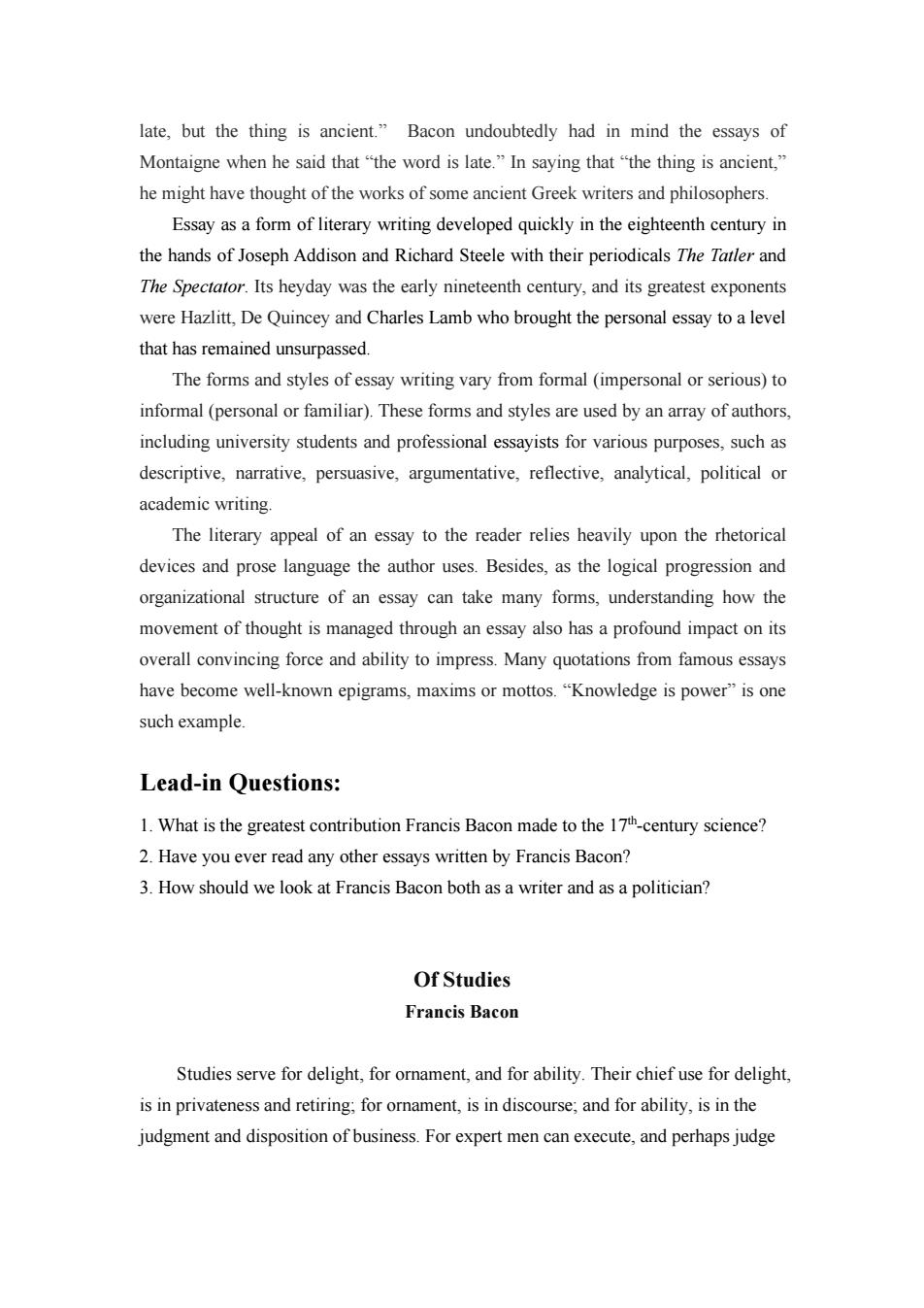
late,but the thing is ancient."Bacon undoubtedly had in mind the essays of Montaigne when he said that“the word is late..”n saying that“the thing is ancient,” he might have thought of the works of some ancient Greek writers and philosophers. Essay as a form of literary writing developed quickly in the eighteenth century in the hands of Joseph Addison and Richard Steele with their periodicals The Tatler and The Spectator.Its heyday was the early nineteenth century,and its greatest exponents were Hazlitt,De Quincey and Charles Lamb who brought the personal essay to a level that has remained unsurpassed. The forms and styles of essay writing vary from formal(impersonal or serious)to informal(personal or familiar).These forms and styles are used by an array of authors, including university students and professional essayists for various purposes,such as descriptive,narrative,persuasive,argumentative,reflective,analytical,political or academic writing. The literary appeal of an essay to the reader relies heavily upon the rhetorical devices and prose language the author uses.Besides,as the logical progression and organizational structure of an essay can take many forms,understanding how the movement of thought is managed through an essay also has a profound impact on its overall convincing force and ability to impress.Many quotations from famous essays have become well-known epigrams,maxims or mottos."Knowledge is power"is one such example. Lead-in Questions: 1.What is the greatest contribution Francis Bacon made to the 17th-century science? 2.Have you ever read any other essays written by Francis Bacon? 3.How should we look at Francis Bacon both as a writer and as a politician? Of Studies Francis Bacon Studies serve for delight,for ornament,and for ability.Their chief use for delight, is in privateness and retiring;for ornament,is in discourse;and for ability,is in the judgment and disposition of business.For expert men can execute,and perhaps judge
late, but the thing is ancient.” Bacon undoubtedly had in mind the essays of Montaigne when he said that “the word is late.” In saying that “the thing is ancient,” he might have thought of the works of some ancient Greek writers and philosophers. Essay as a form of literary writing developed quickly in the eighteenth century in the hands of Joseph Addison and Richard Steele with their periodicals The Tatler and The Spectator. Its heyday was the early nineteenth century, and its greatest exponents were Hazlitt, De Quincey and Charles Lamb who brought the personal essay to a level that has remained unsurpassed. The forms and styles of essay writing vary from formal (impersonal or serious) to informal (personal or familiar). These forms and styles are used by an array of authors, including university students and professional essayists for various purposes, such as descriptive, narrative, persuasive, argumentative, reflective, analytical, political or academic writing. The literary appeal of an essay to the reader relies heavily upon the rhetorical devices and prose language the author uses. Besides, as the logical progression and organizational structure of an essay can take many forms, understanding how the movement of thought is managed through an essay also has a profound impact on its overall convincing force and ability to impress. Many quotations from famous essays have become well-known epigrams, maxims or mottos. “Knowledge is power” is one such example. Lead-in Questions: 1. What is the greatest contribution Francis Bacon made to the 17 th-century science? 2. Have you ever read any other essays written by Francis Bacon? 3. How should we look at Francis Bacon both as a writer and as a politician? Of Studies Francis Bacon Studies serve for delight, for ornament, and for ability. Their chief use for delight, is in privateness and retiring; for ornament, is in discourse; and for ability, is in the judgment and disposition of business. For expert men can execute, and perhaps judge
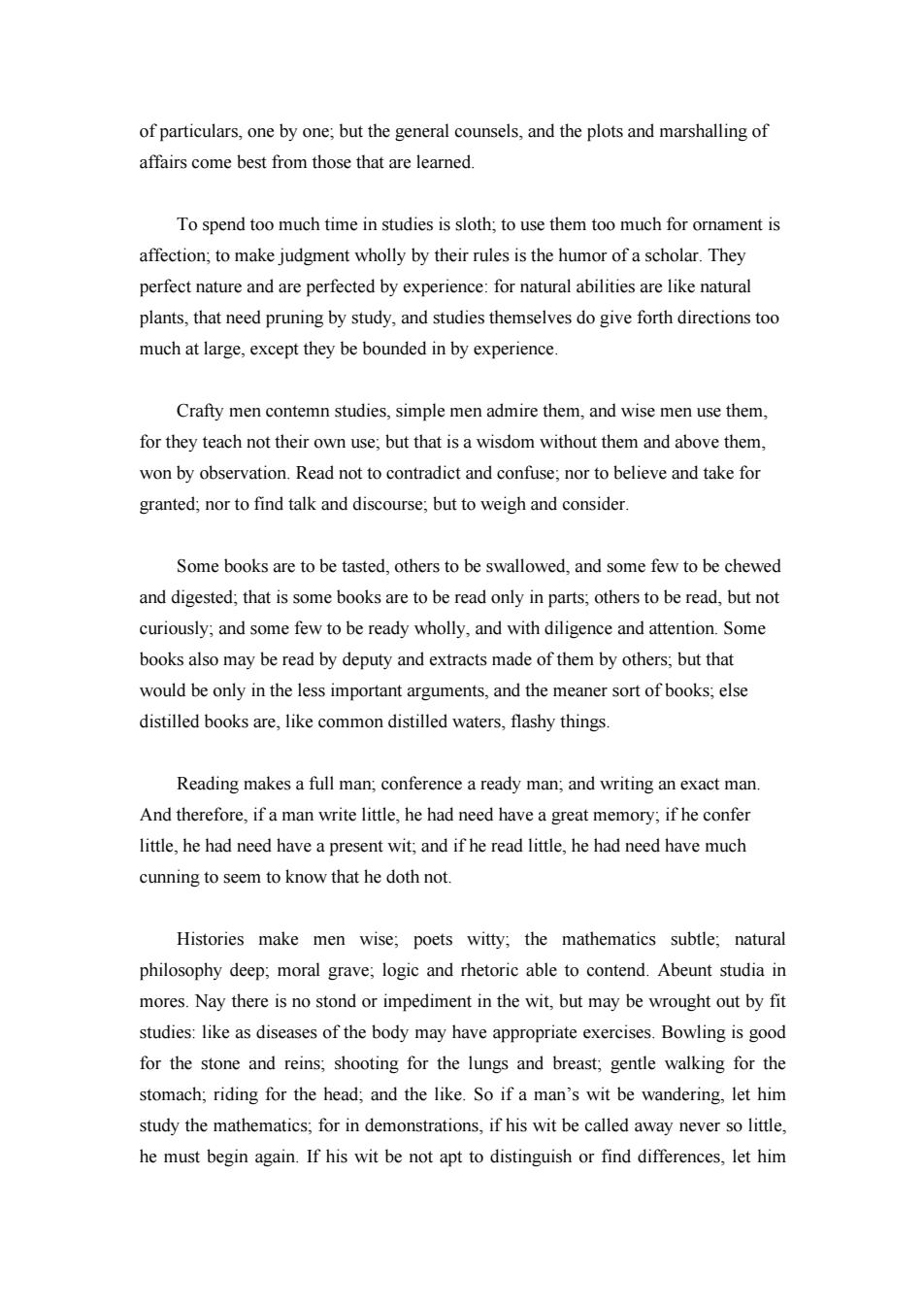
of particulars,one by one;but the general counsels,and the plots and marshalling of affairs come best from those that are learned. To spend too much time in studies is sloth;to use them too much for ornament is affection;to make judgment wholly by their rules is the humor of a scholar.They perfect nature and are perfected by experience:for natural abilities are like natural plants,that need pruning by study,and studies themselves do give forth directions too much at large,except they be bounded in by experience. Crafty men contemn studies,simple men admire them,and wise men use them, for they teach not their own use;but that is a wisdom without them and above them, won by observation.Read not to contradict and confuse;nor to believe and take for granted;nor to find talk and discourse;but to weigh and consider Some books are to be tasted,others to be swallowed,and some few to be chewed and digested;that is some books are to be read only in parts;others to be read,but not curiously;and some few to be ready wholly,and with diligence and attention.Some books also may be read by deputy and extracts made of them by others;but that would be only in the less important arguments,and the meaner sort of books;else distilled books are,like common distilled waters,flashy things. Reading makes a full man;conference a ready man;and writing an exact man. And therefore,if a man write little,he had need have a great memory;if he confer little,he had need have a present wit;and if he read little,he had need have much cunning to seem to know that he doth not. Histories make men wise;poets witty;the mathematics subtle;natural philosophy deep;moral grave;logic and rhetoric able to contend.Abeunt studia in mores.Nay there is no stond or impediment in the wit,but may be wrought out by fit studies:like as diseases of the body may have appropriate exercises.Bowling is good for the stone and reins;shooting for the lungs and breast;gentle walking for the stomach;riding for the head;and the like.So if a man's wit be wandering,let him study the mathematics;for in demonstrations,if his wit be called away never so little, he must begin again.If his wit be not apt to distinguish or find differences,let him
of particulars, one by one; but the general counsels, and the plots and marshalling of affairs come best from those that are learned. To spend too much time in studies is sloth; to use them too much for ornament is affection; to make judgment wholly by their rules is the humor of a scholar. They perfect nature and are perfected by experience: for natural abilities are like natural plants, that need pruning by study, and studies themselves do give forth directions too much at large, except they be bounded in by experience. Crafty men contemn studies, simple men admire them, and wise men use them, for they teach not their own use; but that is a wisdom without them and above them, won by observation. Read not to contradict and confuse; nor to believe and take for granted; nor to find talk and discourse; but to weigh and consider. Some books are to be tasted, others to be swallowed, and some few to be chewed and digested; that is some books are to be read only in parts; others to be read, but not curiously; and some few to be ready wholly, and with diligence and attention. Some books also may be read by deputy and extracts made of them by others; but that would be only in the less important arguments, and the meaner sort of books; else distilled books are, like common distilled waters, flashy things. Reading makes a full man; conference a ready man; and writing an exact man. And therefore, if a man write little, he had need have a great memory; if he confer little, he had need have a present wit; and if he read little, he had need have much cunning to seem to know that he doth not. Histories make men wise; poets witty; the mathematics subtle; natural philosophy deep; moral grave; logic and rhetoric able to contend. Abeunt studia in mores. Nay there is no stond or impediment in the wit, but may be wrought out by fit studies: like as diseases of the body may have appropriate exercises. Bowling is good for the stone and reins; shooting for the lungs and breast; gentle walking for the stomach; riding for the head; and the like. So if a man’s wit be wandering, let him study the mathematics; for in demonstrations, if his wit be called away never so little, he must begin again. If his wit be not apt to distinguish or find differences, let him

study the schoolmen;for they are symini sectores.If he be not apt to beat over matters, and to call up one thing to prove and illustrate another,let him study the lawyers' cases.So every defect of the mind may have a special receipt. Questions for Discussion: 1.What special aspects of study is Bacon concerned about in this essay? 2.How does Bacon demonstrate his dialectic attitude toward study? 3.What kind of metaphor does Bacon use to show the different kinds of reading?In what ways are you impressed by the metaphor? 4.Point out an instance of simile used effectively in the essay. 5.How is the essay structured?How does Bacon make the logic convincing? 6.Pick out one statement you appreciate most in the essay and comment on it by relating it to your study experience. 7.What other rhetorical devices does Bacon use in the essay?Comment on their literary effectiveness. 8.What kind of audience do you think Bacon keeps in mind while writing such an essay?And what is the tone of voice that is noticeable in the whole piece of writing? 9.What response is Bacon trying to evoke through his argument? 10.What kind of details does Bacon use to support his assertions and viewpoints?Do you find them convincing? 11.What is the purpose of the essay?What linguistic strategies does Bacon adopt to achieve this purpose? 12.What learning experiences have you had that may give you some special insights into study? 13.This short essay is among the better-known of all Bacon's essays.Sum up all the stylistic features you can find in the essay. 14.Bacon once wrote:"For myself,I found that I was fitted for nothing as well as for the study of Truth."To what extent are you convinced by Bacon's viewpoints about the“truth”of study?
study the schoolmen; for they are symini sectores. If he be not apt to beat over matters, and to call up one thing to prove and illustrate another, let him study the lawyers’ cases. So every defect of the mind may have a special receipt. Questions for Discussion: 1. What special aspects of study is Bacon concerned about in this essay? 2. How does Bacon demonstrate his dialectic attitude toward study? 3. What kind of metaphor does Bacon use to show the different kinds of reading? In what ways are you impressed by the metaphor? 4. Point out an instance of simile used effectively in the essay. 5. How is the essay structured? How does Bacon make the logic convincing? 6. Pick out one statement you appreciate most in the essay and comment on it by relating it to your study experience. 7. What other rhetorical devices does Bacon use in the essay? Comment on their literary effectiveness. 8. What kind of audience do you think Bacon keeps in mind while writing such an essay? And what is the tone of voice that is noticeable in the whole piece of writing? 9. What response is Bacon trying to evoke through his argument? 10. What kind of details does Bacon use to support his assertions and viewpoints? Do you find them convincing? 11. What is the purpose of the essay? What linguistic strategies does Bacon adopt to achieve this purpose? 12. What learning experiences have you had that may give you some special insights into study? 13. This short essay is among the better-known of all Bacon’s essays. Sum up all the stylistic features you can find in the essay. 14. Bacon once wrote: “For myself, I found that I was fitted for nothing as well as for the study of Truth.” To what extent are you convinced by Bacon’s viewpoints about the “truth” of study?

Writing Task: 1.Write an essay on the topic of hobby or travel.You should first present a clear central argument,and then develop it with convincing details from your own observation,and finally draw a conclusion based on your analysis.Try to make use of rhetorical devices where appropriate. 2.Write a comment on Francis Bacon's"Of Studies"in a short essay.Focus on one point you think most relevant to the success of Bacon's essay for insight and persuasion
Writing Task: 1. Write an essay on the topic of hobby or travel. You should first present a clear central argument, and then develop it with convincing details from your own observation, and finally draw a conclusion based on your analysis. Try to make use of rhetorical devices where appropriate. 2. Write a comment on Francis Bacon’s “Of Studies” in a short essay. Focus on one point you think most relevant to the success of Bacon’s essay for insight and persuasion